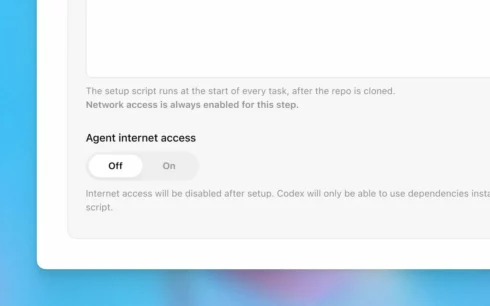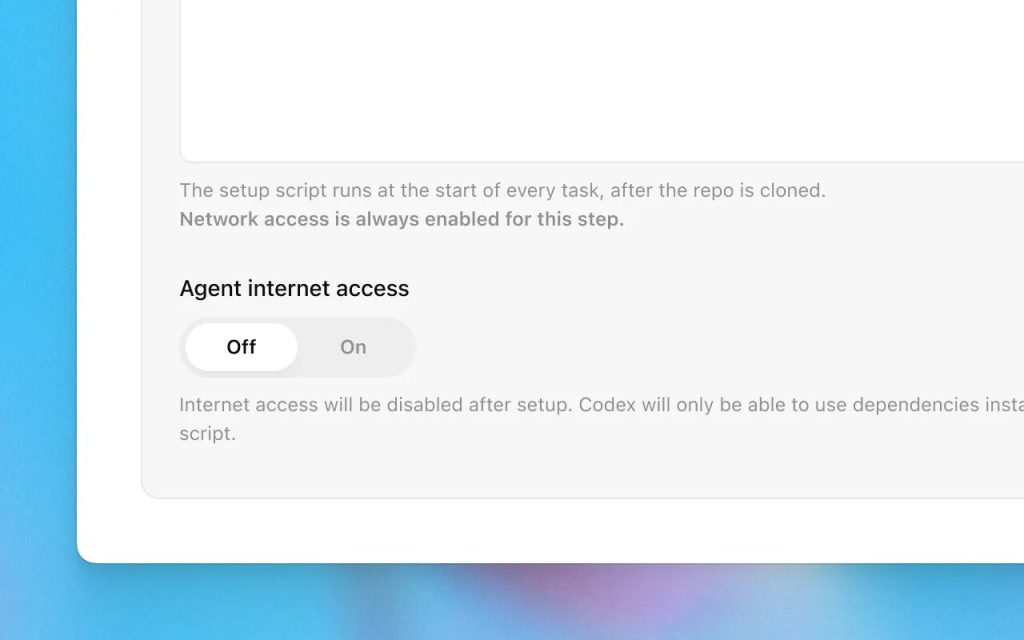

OpenAI announces Codex updates
The coding agent Codex can now access the internet during task execution, opening up new capabilities such as the ability to install base dependencies, run tests that need external resources, and upgrade or install packages.
Internet access is turned off by default. It can be enabled when a new environment is created, or an environment can be edited to allow it. Users can control the domains and HTTP methods that Codex can use.
OpenAI also announced that Codex has begun rolling out to ChatGPT Plus users. The company did note that it might set rate limits for Plus users during high demand periods.
Mistral releases coding assistant
Mistral Code builds on the open-source project Continue, which provides a hub of models, rules, prompts, docs, and other building blocks for creating AI code assistants. It is powered by four different coding models: Codestral, Codestral Embed, Devstral, and Mistral Medium.
It is proficient in over 80 programming languages, and can reason over files, Git diffs, terminal output, and issues. It is currently available as a private beta for JetBrains IDEs and VSCode.
“Our goal with Mistral Code is simple: deliver best-in-class coding models to enterprise developers, enabling everything from instant completions to multi-step refactoring—through an integrated platform deployable in the cloud, on reserved capacity, or air-gapped on-prem GPUs. Unlike typical SaaS copilots, all parts of the stack—from models to code—are delivered by one provider subject to a single set of SLAs, and every line of code resides inside the customer’s enterprise boundary,” the company wrote in its announcement.
Postman introduces Agent Mode to integrate the power of AI agents into Postman’s core capabilities
The agents can create, organize, and update collections; create test cases; generate documentation; build multi-step agents to automate repeatable API tasks; and setup monitoring and observability.
Abhinav Asthana, CEO and co-founder of Postman, told SD Times that it’s sort of like having an expert Postman user by your side.
The company also announced the ability for users to turn any public API on the Postman network into an MCP server. It also launched a network for MCP servers where publishers can host tools for agents and have them be easily discoverable by developers. “We basically took all the remote MCP servers available today, verified them, and put them on the public network,” said Abhinav Asthana, CEO and co-founder of Postman.
FinOps Foundation launches FinOps for AI certification
The training and certification is designed to “help FinOps practitioners understand, manage, and optimize AI-related cloud spend,” the foundation explained.
It will address topics such as AI-specific cost allocation, chargeback models, workload optimization, unit economics, and sustainability.
The lessons will be a four-part series, the first of which is now available, with the other parts launching in September 2025, November 2025, and January 2026. The certification exam will be available in March of next year.
Latest version of Microsoft’s Dev Proxy adds LLM usage and cost tracking
Dev Proxy 0.28 includes the OpenAITelemetryPlugin to provide visibility into how applications are interacting with OpenAI. For each request, it will provide information about the model used, the token count, cost estimation, and grouped summaries per model.
Dev Proxy can also now use the local AI runtime stack Foundry Local as its local language model provider.
Other updates in Dev Proxy 0.28 include new extensions for .NET Aspire, improved generating PATCH operations for TypeSpec, support for JSONC in mock files, and improved logging.
Snowflake introduces agentic AI innovations for data insights
Snowflake Intelligence (public preview soon) is powered by intelligent data agents and provides a natural language experience for asking questions that can result in the delivery of actionable insights from structured and unstructured data. Also in private preview soon is a new Data Science Agent to help data scientists automate routine ML model development tasks, according to the company’s announcement.
Snowflake Intelligence brings together data from numerous sources and uses the new Snowflake Openflow to compile information from spreadsheets, documents, images, and databases simultaneously. The data agents can generate visualizations and assist users in taking action on insights, Snowflake said in its announcement. Snowflake Intelligence can also access third-party knowledge through Cortex Knowledge Extensions, soon to be generally available on Snowflake Marketplace.
Progress adds new AI code assistants
Progress Software announced new AI code assistants and other capabilities built into the Q2 2025 release of Progress Telerik and Progress Kendo UI, .NET and JavaScript UI libraries for modern application development. This release introduces AI Coding Assistants for Blazor and React, AI-driven theme generation and GenAI-powered reporting insights, the company announced.
The AI Coding Assistants can automatically generate code in Telerik UI for Blazor and KendoReact libraries within many AI-powered IDEs, which reduces the time spent on manual edits and shortens development cycles. Further, developerws can make natural language prompts into Progress ThemeBuilder to create custom styles for Telerik and Kendo UI components, the company wrote in its announcement. The releases also include reporting summaries and insights powered by generative AI in Progress Telerik Reporting, as well as a GenAI-powered PDF processing library, which the company said can provide “instant document insights, AI prompt options in the Editor control and new AI building blocks and page templates to speed up UI development.”
IBM announces wastonx AI Labs
Watsonx AI Lab is an innovation hub based in New York City that will connect AI developers with IBM’s resources and expertise.
According to IBM, NYC was chosen for the location because it has over 2,000 AI startups. The company hopes to support those as well as pursue collaborations with local universities and research institutions.
“This isn’t your typical corporate lab. watsonx AI Labs is where the best AI developers gain access to world-class engineers and resources and build new businesses and applications that will reshape AI for the enterprise,” said Ritika Gunnar, general manager of data and AI at IBM. “By anchoring this mission in New York City, we are investing in a diverse, world‑class talent pool and a vibrant community whose innovations have long shaped the tech landscape.”
Read last month’s AI updates here.

